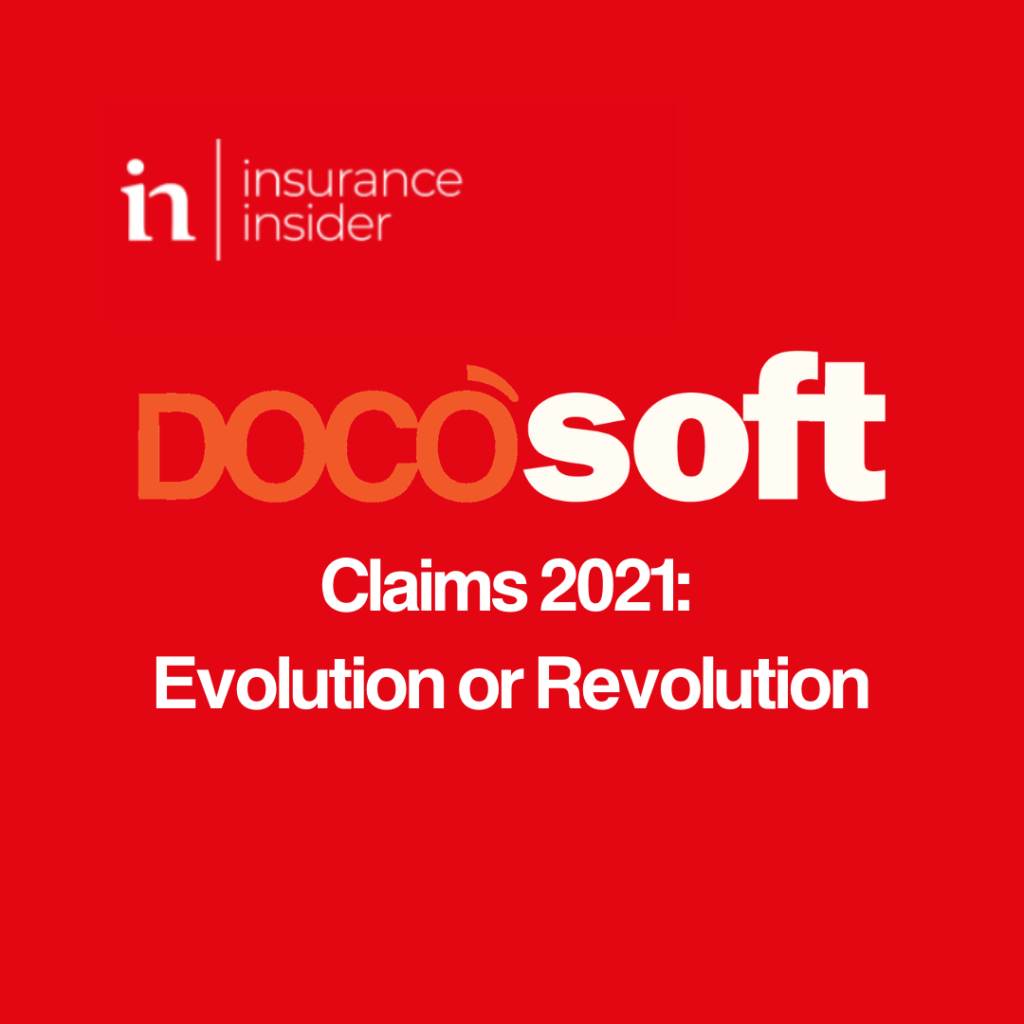Paul Jones Moderates Claims Panel at Insider London Live

How is the role of claims evolving to accommodate the ever-changing nature of risk? That was one of the questions at the Insurance Insider London Live event on the 26th January. The expert panellists, including DOCOsoft moderator Paul Jones, were as follows:
- Stuart Willoughby (Global Head of Claims, SCOR Global P&C)
- Jiyan Zora (Head of International Insurance Claims, Sompo International)
- Clare Constable (Claims Director, HDI Global Specialty SE – UK)
- Sharon Long (Chief Claims Officer, Convex Group Limited)
- Philip Godwin (Head of Claims, Lloyd’s)
- Paul Jones (Head of Business Innovation, DOCOsoft)
The panel began by explaining that the rate of change in the global economy is accelerating faster than ever before and presents new challenges that the insurance industry must address, notably climate change, intangible assets, intellectual property, cyber, the pandemic and the Internet of Things.
According to the panellists, the recently published 2021 Global Risks Report says that diseases are seen as the most impactful risk event, when they were not even the Top five last year. The claims community has been good, however, at adapting to our ever-changing customer needs and realising what we need to do. We’re always talking about changing and how we can evolve to meet these needs.
Panel Quote
“I think we’ve learned from COVID that clients will not tolerate us not evolving to meet their needs. 2021 is the time for claims revolution. We’ve got the massive opportunity of the framework of Blueprint Two which came out saying that the company market and claims market will all be the solution so it’s holistic, one solution to the clients. The whole market needs to get behind claims.”
Inherent to claims is the way that we react to change. We’re constantly challenged to react to unique, complex and thought provoking circumstances. What we have in the market is a set of individuals who really have honed that skill. Claims people have a really good bird’s eye view of what’s going on within their own organisation. They’ve got a view of what’s going on in underwriting, within pricing, within reserving and within operations and that gives us a unique place at the forefront of reacting to how the market will behave as risk evolves.
Panel quote
“I think our industry has obviously come in for some criticism, but I feel as if we’ve hardly missed a heartbeat in terms of the administration of claims. I think that bodes well for the future. It will be a much more flexible working environment as we go forward. Maybe not a revolution but an acceleration of a programme of change that we’re going through already.
We have a great deal of trust to win back as an industry. We did the best we could in the circumstances, but it has to be better. We’ve got to focus more effort on understanding the client’s needs and helping them. That means looking at our wordings, looking at really clear policies in this marketplace and winning back our clients’ trust.
Panel quote
“Deeply understanding our client base is crucial. The mission we have is to increase our depth of understanding of our client base. Building a policy that is fit for purpose. However, it was a fabulous performance in terms of keeping industrial claims machine going in the London market paying billions of pounds worth of claims last year in the midst of a work from home redeployment.”
So how can the London market create a more attractive reinsurance claims offering?
We need to narrow it down to a few things. Number one, we need to nurture, invest, develop, and sell the technical capability of this market from the client’s perspective. We have some truly fabulously skilful people in the market. We’ve got some great people coming through. If you’re a client buying professional indemnity cover want to ensure that someone can really sit with you at the table in a claims situation, and give you advice on a product recall case, for example.
Number two, we’ve got to reengineer the process. It’s got to be faster or more efficient. Be more economic, it’s got to be more transparent, that’s crucial. We’ve got to exploit technology to help our people. It will also really accelerate those processes that we want to close down. Blueprint Two is a London market programme of work. So, there can be no doubt, we’re on the road to change in a really purposeful way, and that’s a huge positive. So, you’ve got an almost doubling up effect, you’ve got work within businesses and you’ve got a big London market programme and it is vital we deliver that. Every claim is an opportunity to reinforce the value of our market.
Panel quote
“The client is key. What is critical for the success of new technology is e-processing. It may not be so relevant to the London market, but ACORD standard messaging or structured messaging to actually deploy the technology we want to deploy as a port is fundamental and critical in terms of how we move forward. Certainly, from what I see not just for London but across the globe.”
The key point about Blueprint 2 over the next two years is build out the core components. After that it’s about the adoption. It really does go right to the heart of building out that digital contract, and then linking the claims activity to that and pursuing all the things that we collectively under the blueprint see as valuable. For example, putting out that capability for straight through processing, which is a real ambition and speeding up the payments. The framework for the next two years is build out, prove out. Get that framework for the digital marketplace underway. Blueprint 2 is a programme of work for the London market. It goes right to the heart of process reengineering and digitisation.
